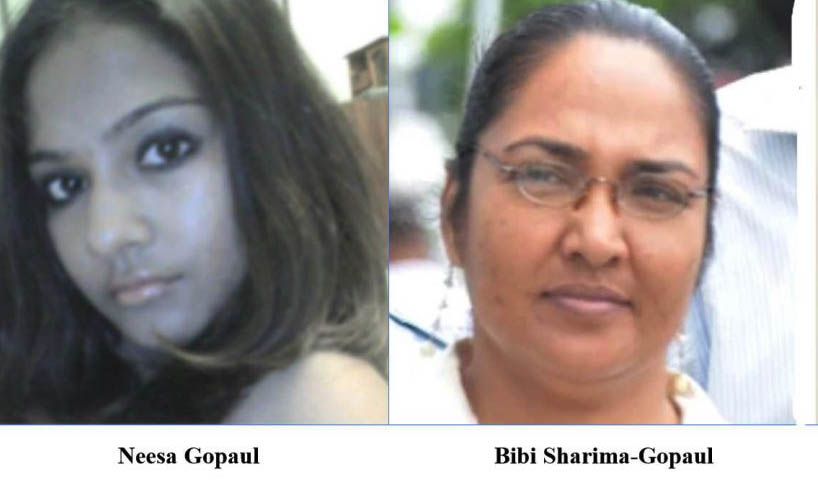Bibi Sharima-Gopaul, who had been found guilty of murdering her daughter Neesa Gopaul, 16, in 2010 has been released from jail and the Guyana Prison Service is expected to issue a release on the matter “shortly”.
Sharima-Gopaul had been detained in 2010 for the murder and had originally been sentenced in the High Court to 106 years in the prison. The Guyana Court of Appeal later reduced this figure to 45 years and in August last year, the Caribbean Court of Justice further cut this sentence to 25 years.
News circulated on Wednesday evening of her release though it was unclear how this could have been possible since she was supposed to serve 25 years for the gruesome crime.
A prison year is generally considered to be nine months. Even if this is taken account of it would mean that as of yesterday Sharima-Gopaul would have been in jail for 17.3 prison years, a far cry from the 25 years she has been jailed for.
The 13 years would have also covered the period she spent on remand awaiting trial. It is unclear if there was a remission and on what grounds.
Contacted by this newspaper yesterday afternoon, Director of Prisons Nicklon Elliott was asked whether the Guyana Prison Service would be issuing a statement on the release of the convict as he had been quoted in other sections of the media confirming this.
Elliot stated that the service does not “normally issue releases” on the release of prisoners. It was pointed out that this was a high-profile matter and one of great public interest and he was then asked if he was going to confirm to “us” meaning Stabroek News about the release.
The Director then questioned “who us?” and the reporter explained that she was calling on behalf of the Stabroek News, as she had indicated initially, and not herself. Saying that the reporter was “sounding rude” the Director then stated that his public relations officer should be contacted. He was asked again and he repeated that the public relations officer should be contacted.
This newspaper was minutes later told that a release will be issued “shortly” on the matter when the public relations officer was contacted.
On August 19 last year, the CCJ freed Jarvis Small of the murder of 16-year-old daughter Neesa Gopaul, while commuting the sentence of her mother to 25 years behind bars. Small was freed owing to the finding by the CCJ that his trial seven years ago for the murder of the former Queen’s College student was plagued by prejudicial evidence.
It, however, affirmed the conviction of his former lover and co-defendant Sharima-Gopaul but reduced a 45-year sentence, which had been imposed by the Guyana Court of Appeal, from her initial sentence of 106 years, following her trial.
Small had been sentenced to 96 years.
Regarding the issue of sentencing, which was delivered by Justice Peter Jamadar, the CCJ found that there had been “no fair and just sentencing process.”
It found that the 106 years imposed on Sharima-Gopaul exceeded the life expectancy of a human being and was “grossly disproportionate” and “manifestly excessive.”
The Court said that the sentence, and the manner in which the trial judge went about it, were contrary to the constitutional guarantees in Article 144 of a fair hearing by an independent and impartial court—and to Article 141 as the disproportionate and excessive penalty imposed—was tantamount to “inhuman and degrading punishment.”
While not as “grossly disproportionate” as the original sentences, the CCJ said that the 45 years terms imposed by the Guyana Court of Appeal were still too harsh, noting that it made no discount for pretrial custody nor eligibility for parole as is set out in case law precedent and legislation respectively.
Noting all of the circumstances of the case, especially the fact that it was a minor who was killed at the hands of her mother who would have breached her trust and who failed to act as her protector and displayed no remorse, the regional Supreme Court said that there was justification for those to be reasons warranting additions.
As a result, to its base of 22 years, the Court then added eight years for the aggravating factors. From the total of 30 years, it, however, then deducted five years for the time Sharima-Gopaul spent behind bars awaiting trial.
It ordered that she is not to be considered eligible for parole before serving 15 years, which it said would meet the penological objectives of sentencing.
Following the discovery of her battered body stuffed in a suitcase dumped at a creek along the Soesdyke/Linden Highway, several non-governmental organizations came out in protest, saying that the “system had failed” Neesa.
At the trial, the High Court had heard that Neesa had made several police reports of Small sexually assaulting her.







